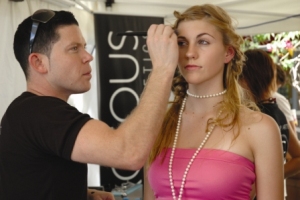The Academy of Makeup was founded by college principle, David McConnell, in Melbourne in 1999. He has since opened two more campuses in Sydney and Brisbane. The academy prides itself in on offering students world-class training and is highly regarded by students and professionals alike. Professional Beauty caught up with the man himself.

PB: How long have you been principal of the college and what do you enjoy most about your job?
DM: I have been principal of the college for 12 years. The thing I enjoy most about my job is seeing all of my students grow and learn as the course progresses. On the first day, they don’t know very much at all, then, by the next time I see them, they know a few techniques and I can see the improvement. I watch them get even better as the weeks go on. By the time they graduate they’re fantastic makeup artists.
PB: What courses do you offer and who can enroll?
DM: We offer a range of courses, from Certificate II right through to Diploma level. All of our courses are government accredited and nationally recognised qualifications. Anyone can enroll – you don't need any experience, but you definitely need a passion for makeup.
PB: What sets Academy of Makeup apart from similar colleges?
DM: When I started Academy of Makeup, I set out to be the market leader. I wanted to create a training facility that produced and provided a first class syllabus, with first class facilities, and that’s what the Academy has offered from the day one. We provide our students with the best trainers from within the industry, giving them the best chance to suceed when they graduate.
PB: How do you prepare you students for working in the competitive makeup industry?
DM: The makeup industry is not easy to break into, and what a student plans to do with their qualification can change many times before they graduate. We prepare our students by helping each one figure out exactly what they want to do when they graduate, and assist them towards that specific goal. We let them know from the start that there are many different aspects to the makeup world. Not everyone will end up working backstage at fashion shows- although that’s what they all want to do on day one. We aim to assist each student discover and reach their full potential, be it in fashion catwalk makeup, freelance, SPFX, cosmetic retail, theatre or business management.
PB: What work experience opportunities do you offer your students to help them build their portfolios?
DM: We offer our students plenty of work experience opportunities throughout the duration of their course. Being such a large college (with campuses in three states) we get phone calls to our head office on a daily basis requesting students for jobs. Also, our affiliation with Gorgeous Cosmetics and their makeup artists means that our students often get to assist these professional artists when they work large scale events, such as fashion parades, photo shoots and charity events. In fact, 12 of our students recently assisted backstage at Mercedes-Benz Fashion Festival Sydney.
PB: Does the college spend much time teaching the students about best practice?
DM: Yes, right from the start we drill ‘best practice’ into our students. It is probably the key element of being a makeup artist. Elements like hygiene, self-presentation, etiquette and respect are the most important aspects of running a business and, as a makeup artist, you are the business. If you’re always running late for jobs or your tools are constantly dirty then your makeup skills won’t matter; you won’t get booked. We teach our students that to attract clients, they must present themselves and their work in the best possible light.
PB: What advice would you give someone wanting to become a makeup artist or further their education in the industry?
DM: A long time ago, I was in Hollywood and a makeup artist said to me, “To be good, do makeup. To be the best, do makeup every day.” This is something I have never forgotten. I always tell my students that anyone can be a makeup artist, but to be a great one, to be the best, you have to practice every day. You have to challenge yourself. If you’re not confident at doing a red lip, do it every day until you perfect it. If you do makeup every day then you’ll give yourself the best chance of suceeding.
PB: What have some of your most successful students gone onto do?
DM: Many of our past students are now successful freelance makeup artists, whose exceptional talents not only span bridal and photographic/editorial makeup artistry, but also TV and events. Other graduates are making a name for themselves in the fashion industry, working for well-known makeup houses and travelling the globe with high-fashion runway shows and events. Several of our past students have been recognised within the makeup community for their outstanding SPFX and airbrushing skills, with a number of recent graduates featuring their extrodinary work at the IMATS.
PB: Where do you see the makeup industry heading in the next five years?
DM: I think technology will play a big part in our industry over the next few years. Everything from freelance makeup artistry to SPFX will be affected by technological advances in things like digital enhancing, post production alterations and 3D modeling. Computers will continue to become a major part of every industry, even makeup, so we need to keep up. In three years time I hope to be running 3D modeling classes at the Academy to better prepare students for the ever-changing industry.
Visit www.makeuptraining.com.au to find out more.

